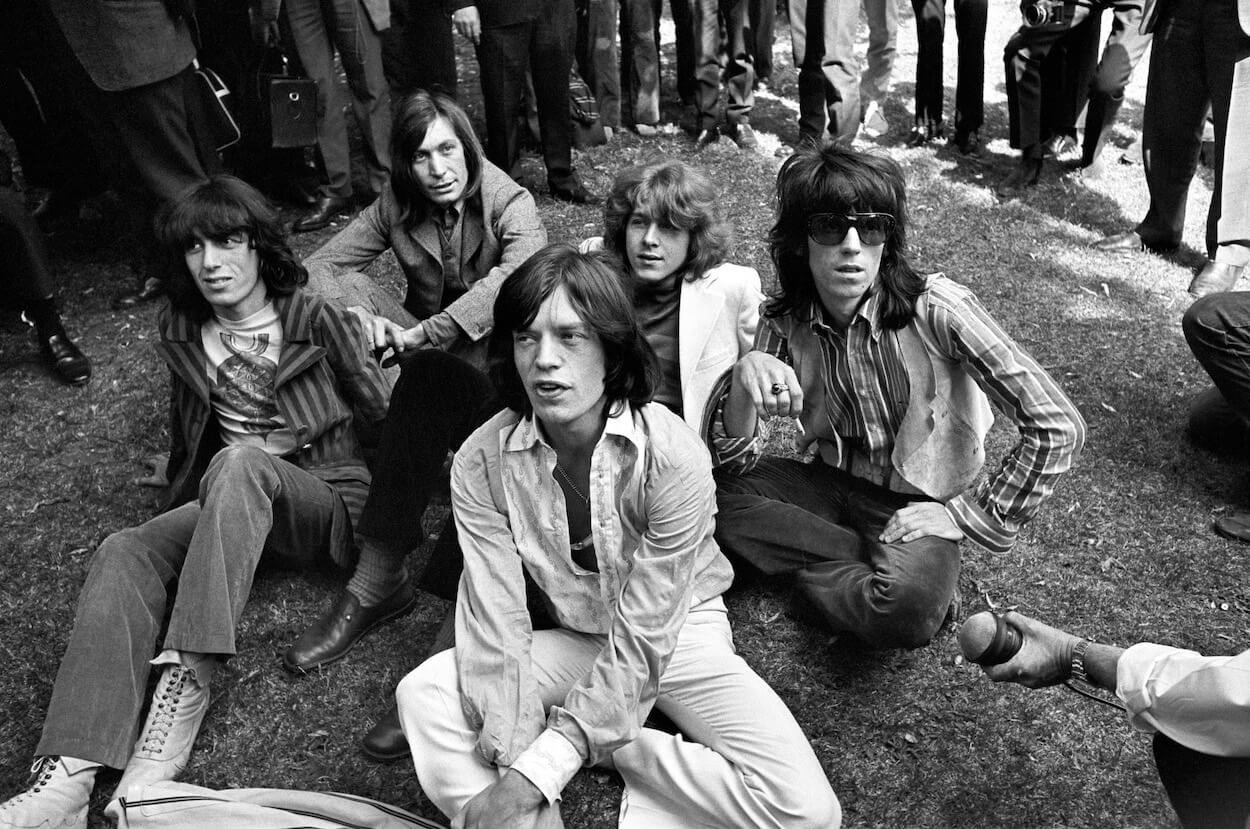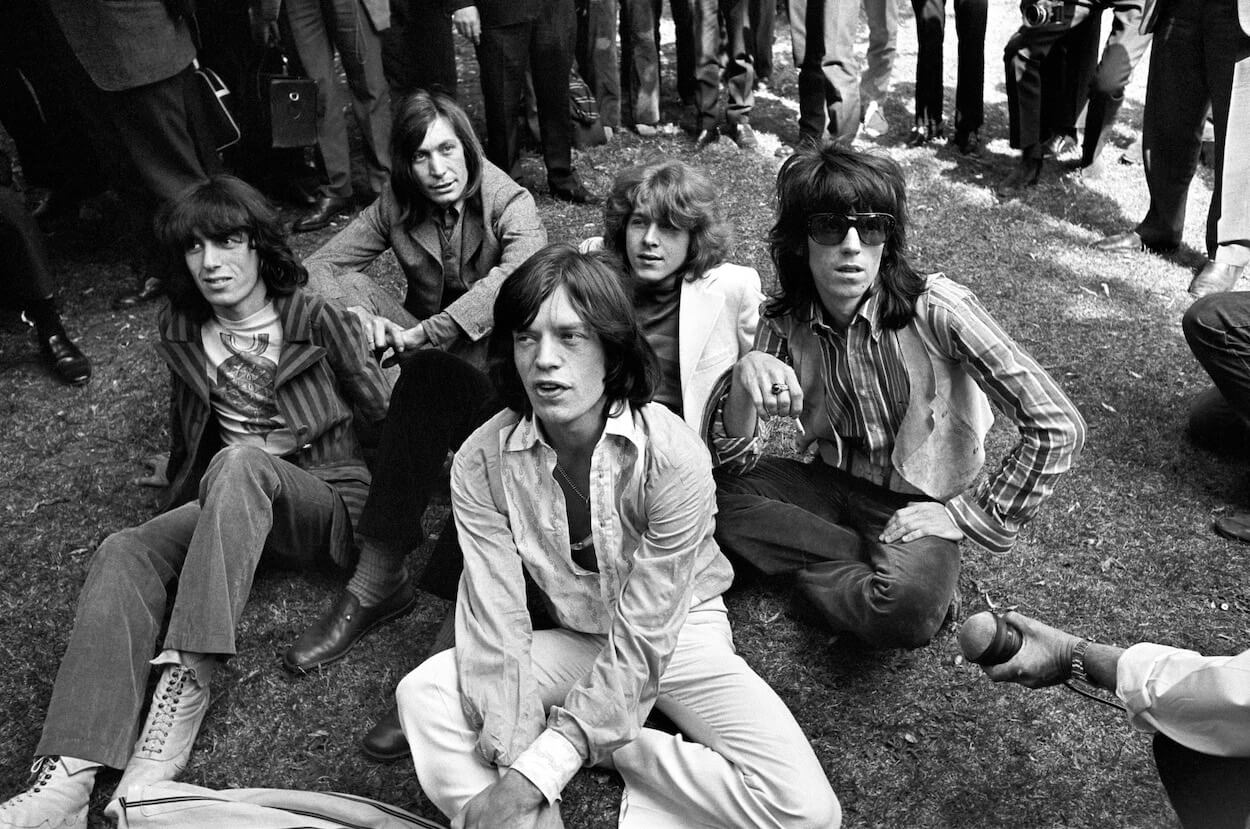
7 of The Rolling Stones’ Best Ballads
The Rolling Stones built their reputation by playing blue-blooded rock music. Yet many of their No. 1 hits were heartstring-tugging ballads. Here are some of The Rolling Stones’ best ballads from their 60-year career.

1. ‘As Tears Go By’
The Rolling Stones essentially covered this song by Mick Jagger and Keith Richards. They handed it to Marianne Faithfull (Jagger’s girlfriend at the time), who recorded her version first.
Somehow, the 20-something Jagger convincingly conveyed the longing and loneliness of old age with just a few lines of lyrics in a song lasting less than three minutes. The gently plucked acoustic guitar and syrupy strings added to the effect. The Stones dropped the folk-tinged “As Tears Go By” in 1966, and it stands as one of their finest ballads decades later.
2. ‘Ruby Tuesday’
“Ruby Tuesday” from the 1966 album Between the Buttons might be one of the most melodic Jagger-Richards tunes in the Stones’ catalog. The mournful strings, Brian Jones’ lighthearted recorder, and a tasteful piano riff hammer home the balladry. Jagger’s lyrics of love unobtainable (rather than love lost) proved poetic — a folk-tinged cover of the song was more popular in England than the original. American audiences, however, were far more receptive to “Ruby Tuesday” and sent it to No. 1 on the Billboard charts.
3. ‘No Expectations’
In keeping with some of The Rolling Stones’ other top ballads, they kept the instrumentation sparse on “No Expectations.” It’s just Jagger’s voice and guitar — Richards’ acoustic strumming and Jones’ ramshackle slide playing — with Bill Wyman’s intermittent tumbling bass, Charlie Watts’ barely perceptible woodblock, and Nicky Hopkins’ plinking piano. Coming after the rousing Beggars Banquet (1968) opener “Sympathy for the Devil,” the soothing “No Expectations” was a tonal 180, but one that played well.
4. ‘Wild Horses’
Does it matter that Jagger said “Wild Horses” is based on an awful cliche? Not to us. The tasteful country-tinged tune (who would have thought?) might be the most sincere of their heartfelt ballads. The languid acoustic guitar strumming, rustic electric guitar, and barroom piano playing hammer home the country feel. Interestingly, like “As Tears Go By,” The Rolling Stones recorded their version of the song (from 1971’s Sticky Fingers) second. The Flying Burrito Brothers did it first, though the Stones performed the more enduring rendition.
5. ‘Moonlight Mile’
Despite its cover art and despite housing songs such as “Brown Sugar,” “Bitch,” and “Can’t You Hear Me Knocking,” Sticky Fingers went heavy on the ballads. We mentioned “Wild Horses” a minute ago. Now we’re skipping over “Sister Morphine” and “Dead Flowers” to get to “Moonlight Mile.”
Jagger’s song about homesickness begins with plaintive acoustic guitar strums before piano, drums, and strings enter the picture. His lyrics vividly paint a picture of the drudgery of touring life (with lines such as “The sound of strangers sending nothing to my mind” and “Made a rag pile of my shiny clothes”) and the longing for home. The standout Rolling Stones ballad takes a hopeful turn toward the end as he gets closer to the security of home.
6. ‘Angie’
We wouldn’t stop you if you wanted to make a case for “Angie” being the best Rolling Stones ballad. It checks all the boxes of a standout slow rocker: Minor-key guitar, tasteful and mournful piano, gently swelling strings, restrained pace, and heart-crushing lyrics.
The Goats Head Soup (1973) centerpiece is on the Mount Rushmore of breakup songs. The Rolling Stones wrote beautiful ballads throughout their career, but “Angie” was their pinnacle. It went to No. 1 in the United States and rose to No. 5 in England, spending a combined 26 weeks in the charts in those two countries (16 in the U.S. and 10 in the Stones’ homeland).
7. ‘Waiting on a Friend’
The Stones’ pace slowed down in the mid-1970s, and it made total sense. Except for the year 1970, they had at least one album in stores every year between 1964 and 1974. The rockstar lifestyle excesses probably didn’t help them keep chugging along. Tattoo You proved to anyone who counted them out at the dawn of the 1980s that the band still had some magic left. “Waiting on a Friend,” the final song on that 1981 album, dated back nearly a decade to the Goats Head Soup sessions, but the band gave it a modern sheen for Tattoo You.
The song’s airy production provided room for Watts’ samba-esque beat, Wyman’s wonderfully understated bass line, and Richards’ shimmering guitar room to breathe. And they needed that space. Sonny Rollins’ sax playing — both the mid-song solo and the outro — was probably the best of any Rolling Stones song. All the while, Jagger laid out his heart, singing about the importance of long-term friendships with lines such as, “Making love and breaking hearts / It is a game for youth / But I’m not waiting on a lady / I’m just waiting on a friend.” The Rolling Stones don’t have many finer ballads in their catalog.
For more on the entertainment world and exclusive interviews, subscribe to Showbiz Cheat Sheet’s YouTube channel.


